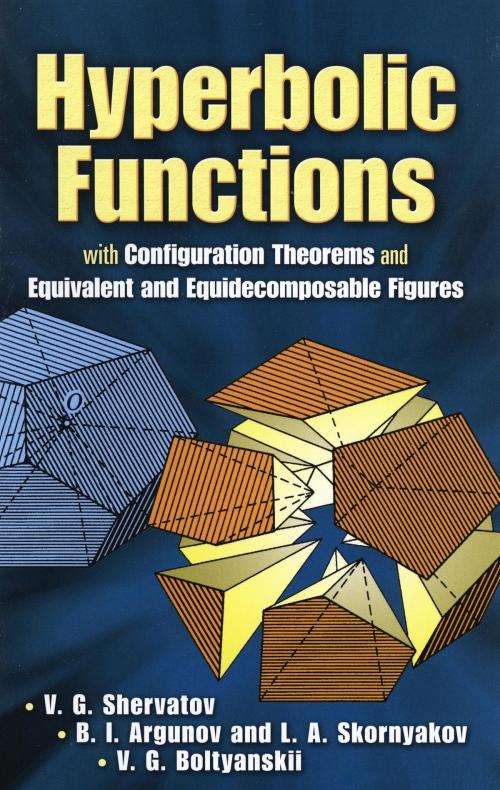Hyperbolic Functions
with Configuration Theorems and Equivalent and Equidecomposable Figures
Nonfiction, Science & Nature, Mathematics, Trigonometry| Author: | L. A. Skornyakov, B. I. Argunov, V. G. Boltyanskii, V. G. Shervatov | ISBN: | 9780486170053 |
| Publisher: | Dover Publications | Publication: | November 7, 2013 |
| Imprint: | Dover Publications | Language: | English |
| Author: | L. A. Skornyakov, B. I. Argunov, V. G. Boltyanskii, V. G. Shervatov |
| ISBN: | 9780486170053 |
| Publisher: | Dover Publications |
| Publication: | November 7, 2013 |
| Imprint: | Dover Publications |
| Language: | English |
This single-volume compilation of three books centers on Hyperbolic Functions, an introduction to the relationship between the hyperbolic sine, cosine, and tangent, and the geometric properties of the hyperbola. The development of the hyperbolic functions, in addition to those of the trigonometric (circular) functions, appears in parallel columns for comparison. A concluding chapter introduces natural logarithms and presents analytic expressions for the hyperbolic functions.
The second book, Configuration Theorems, requires only the most elementary background in plane and solid geometry. It discusses several interesting theorems on collinear points and concurrent lines, showing their applications to several practical geometric problems, and thus introducing certain fundamental concepts of projective geometry. Equivalent and Equidecomposable Figures, the final book, discusses the mathematical conditions of dissecting a given polyhedron into a finite number of pieces and reassembling them into another given polyhedron.
This single-volume compilation of three books centers on Hyperbolic Functions, an introduction to the relationship between the hyperbolic sine, cosine, and tangent, and the geometric properties of the hyperbola. The development of the hyperbolic functions, in addition to those of the trigonometric (circular) functions, appears in parallel columns for comparison. A concluding chapter introduces natural logarithms and presents analytic expressions for the hyperbolic functions.
The second book, Configuration Theorems, requires only the most elementary background in plane and solid geometry. It discusses several interesting theorems on collinear points and concurrent lines, showing their applications to several practical geometric problems, and thus introducing certain fundamental concepts of projective geometry. Equivalent and Equidecomposable Figures, the final book, discusses the mathematical conditions of dissecting a given polyhedron into a finite number of pieces and reassembling them into another given polyhedron.















